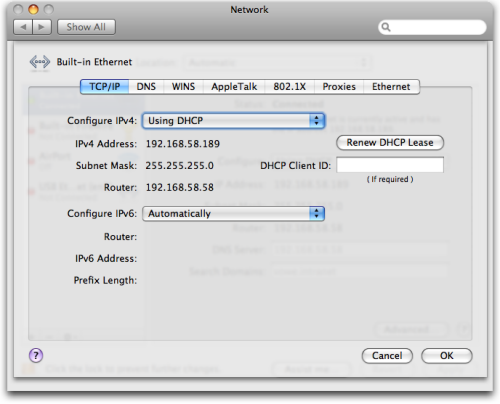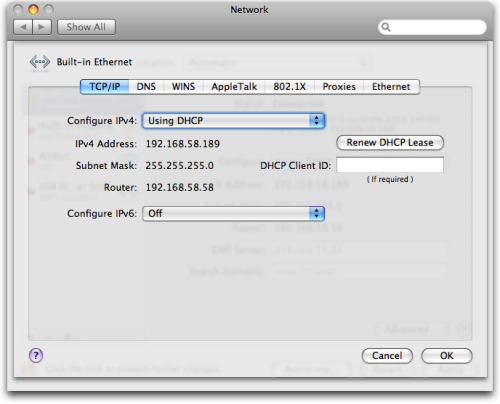What is it with IPv6 on my computers?
by Volker Weber
My neighbor asked me about something that was troubling him. Why was his computer configuring an IPv6 interface and would not let him disable it? He is on Windows, so I did not know. Checked my Mac and found this:

Looks like it is configured to automatic, but does not have any information. But then I issued an ifconfig (ipconfig on Windows), it would show this:
en0: flags=8863
inet6 fe80::21e:c2ff:fe0e:1d45%en0 prefixlen 64 scopeid 0x4
inet 192.168.58.189 netmask 0xffffff00 broadcast 192.168.58.255
ether 00:1e:c2:0e:1d:45
There seems to be an IPv6 address attached, that is not showing up on the GUI. If I turn the interface off like so, it will no longer be there in ifconfig.

My neighbor tells me that Windows won't let him shut off IPv6. What is the master plan here?
Comments
You can disable IPv6, but it is not possible to deinstall the whole stuff (at least not for Vista).
Link to Microsoft Technet
It was a long time ago, when I did this, so I am not totally sure, but I think I just deinstalled "Microsoft TCP/IP v6" protocoll which was installed in addition to the known v4 one. I have never been bugged again...
Oh, is he on Vista? That's maybe much more difficult there. I have to admit, with Vista I am on the Refuse-To-Use side of users.
I only fought with Vista once. This and this is what I did to turn off IPv6.
Oops, Owen already provided the first link. Sorry.
@Vowe: If you have autoconfigure turned on you will always have some sort of local link IP on the v6 interface. This is tied to the MAC address of your NIC. If you also have a v6 router in your network then you will have an assigned v6 IP aswell that will be listed in the prefs pane together with its prefix. To make this happen you will have to have a 'radvd' (router advertisement daemon) running. This acts like a DHCP server in v4 networks.
As others have pointed out, your neighbour is on Vista which implements IPv6 by default. Links already provided will help with disabling it.
I just thought I'd point out that this issue is increasingly widespread.
There should be no need to disable IPv6, if everything else in the network is working correctly. Sadly, it is often the case that border router devices (especially those typically found in domestic installations) and/or some ISPs' upstream resolvers do not degrade gracefully when presented with AAAA lookup requests.
Thus IPv6 has to time out on the Vista (or, very often, Mac) computer, before it fails back to IPv4 and continues working. This can make networking IPv6 enabled devices a miserable experience, but the fault is not Vista's, or OS X's. It is generally the ISP who is to blame.
With so many people now choosing to disable IPv6 for this reason, I wonder whether IPv6 itself will ever gain any momentum.
@Chris
Thanks for pointing out why someone would want to deactivate IPv6 support. Might come in handy some time.
Just in case something is no longer working correctly after disabling IPv6 you might want to read this: IPv6 and mobileme
I haven't played around with my IPv6 settings on my MacBook and I don't use MobileMe, so I can't confirm any of this, but I wanted to let you know just in case.
The master plan is this: current OSes like Linux, OS X and Windows Vista should be prepared for a possible IPv4 address exhaustion. See the counter, saying 761 days to go.
"The IPv4 address space will be exhausted in 3-5 years" has been said before, so if you need a reason to use IPv6 right now, have a look at the cool-ipv6-stuff
FYI: with the local fe80::-addresses, you're *not* connected the outside IPv6 world. You'll get an IPv6 that starts with a 2 (like 2001: and 2002:) if you're connected beyond your LAN. As long as your ISP does not provide native IPv6, you can use tunnel techniques like AICCU from sixxs.net, or tspc from from go6.net.

